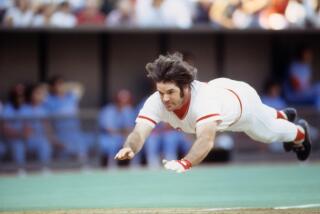Will Reggie Be a Hit in the Booth?
- Share via
Dispenser, in his time, of 563 home runs, Reggie Jackson always rejected appraisals of baseball scientists that he was a hazard in the field.
Reggie’s vision, it was charged, was faulty, preventing him from tracking, and scooping up deftly, ground balls. He wore glasses when he played, but insisted he needed them “only to pick up the spin of curve balls when I am at bat.”
Today, at 43, Reggie has shifted to the booth, still wearing glasses to pick up the spin, and, viewers hope, everything else going on in the 55 games of the California Angels that KTLA is televising this year.
Reggie is teamed with another former big leaguer, Joe Torre, forming an amalgamation the station insists has no commitment on the air to the home side.
“They are not under wraps,” says Joe Quasarano, director of sports and production for KTLA the last 13 years. “They have total latitude to say what they feel needs saying.”
The outsider arches an eyebrow, always wary of such manifestoes, but Reggie vouches for the policy, leading you to conclude that if he talks as good a game on the air as he does off, he may be palatable.
At the local level across the republic, not too many baseball broadcasters are.
In his experience on television, Jackson has done baseball sporadically for ABC, but began for that network in 1974 doing “Superstars.” At the time, he tilled an oar in right field for the Oakland A’s, Charlie Finley, proprietor.
Doing an interview on “Superstars” with Hall of Famer Ernie Banks, Reggie was getting instructions through his earpiece from Don Ohlmeyer, then producer of the show. It got confusing for Reggie--so much so that he removed his earpiece on camera.
“When Ohlmeyer screamed at me afterward,” recalled Jackson, “I said to him, ‘If you don’t get off my back, I’m going back to Oakland. No one screams at me but Charlie Finley.’ ”
From that fragile start, television had to get better for Reggie, who since has done commercials hawking toothpaste, automobiles, TV sets, margarine, even a candy bar bearing his name, but destined to enter into rest.
Reggie also has acted on TV, doing, among other things, an episode of “Love Boat” in which he struck out with the girl, but helped a kid who had problems with his parents.
It could have been worse. The Love Boat could have hit an iceberg. A lot of viewers wish it had.
“What do you feel is your function as a baseball analyst?” Reggie is asked.
“My function,” he responds, “is to make people, including women and children new to baseball, understand everything that’s happening on the field. I must do that in a clear, concise way. If I stumble, don’t blame it on inexperience. Say I stink.”
“What’s your policy on talking about players who stink?” he is asked.
“I played in the majors 21 years,” he answers. “I was attacked plenty by critics. I got it for striking out. I got it for botching plays. I never objected to criticism I had coming. I fired back only at cheap shots. In the booth today, I criticize, but guard against delivering the cheap shots I hated when I played.”
“What, for instance, constitutes a cheap shot?”
“Say I would work a Dodger game that involves Orel Hershiser,” he answers, citing an unlikely situation. “Hershiser is beaten. I don’t say that for $2.7 million a year he should pitch better than that. Once the game starts, the money isn’t related to what happens.”
At Arizona State University, where, you would guess, he majored in runs batted in, Reggie actually earned a degree in biology. The son of a Philadelphia tailor, Martinez Jackson, Reggie credits his ability to articulate to his father.
“My father never allowed me to talk in his presence in street vernacular,” Reggie once confided. “When I would say ‘uh-uh,’ he would lecture, ‘Reggie, you mean no. ‘ ‘And he would never let me get away with saying ‘yeh.’ With careful enunciation, he would say yes. “
Traveling life’s boulevard, Reggie learned to say a lot of things he shouldn’t have, earning his share of detractors, but his business acumen seems to be established.
He was the first player in modern baseball, for example, to work for a piece of the gate. Signing with the Angels in 1982, he manipulated a bonus of 50 cents for each ticket sold beyond 2,400,000. When Angel attendance that year zoomed to a club record 2,807,360, Reggie turned a nifty buck, in addition to his base pay.
The purpose of KTLA’s enlisting him for the Angel games this year is ill-concealed. The hope is that one heading for the Hall of Fame will capture the fancy of viewers who watched him entertain in the majors for two decades.
The station, though, must remember the sensitivity of Reggie. He no longer has Charlie Finley to go back to, but, you scream at him, and he’ll go back to someone.
More to Read
Go beyond the scoreboard
Get the latest on L.A.'s teams in the daily Sports Report newsletter.
You may occasionally receive promotional content from the Los Angeles Times.






